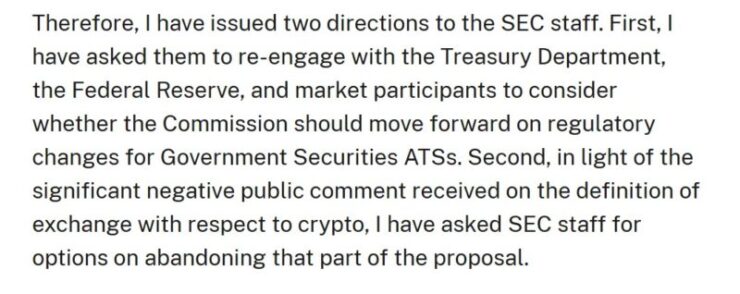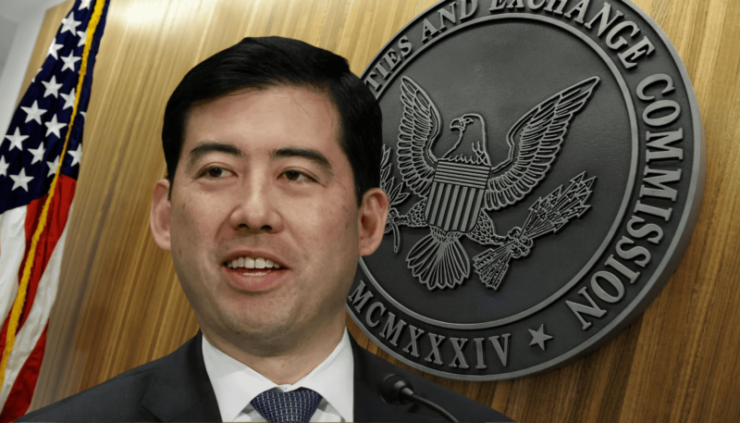The U.S. Securities and Exchange Commission (SEC) is moving away from a controversial proposal that would have required some cryptocurrency firms to register as Alternative Trading Systems (ATS). Acting Chairman Mark Uyeda announced on Monday that he has directed SEC staff to explore ways to abandon this part of a 2022 proposal, citing widespread industry and public opposition.
Speaking at the Institute of International Bankers’ (IIB) Annual Washington Conference, Uyeda acknowledged concerns that the proposal, introduced under former SEC Chair Gary Gensler, was an overreach. The original rule expanded the definition of ATS to include entities categorized under vague terms such as “communications protocols,” potentially affecting decentralized finance (DeFi) platforms and even private trading chat groups.
“It was a mistake for the Commission to link together regulation of the Treasury markets with a heavy-handed attempt to tamp down the crypto market,” Uyeda stated.
“In light of the significant negative public comment received on the definition of exchange with respect to crypto, I have asked SEC staff for options on abandoning that part of the proposal.”
Industry experts have long argued that applying ATS rules—designed for traditional stock exchanges—to crypto platforms would have imposed excessive compliance burdens without offering meaningful consumer protection benefits.
Uyeda echoed these sentiments, noting that market participants had not gained any actual advantages from the additional disclosure requirements and protections outlined in the original proposal.

With the SEC backing away from this rule, crypto firms bracing for legal battles over ATS registration may now see a reduction in regulatory pressure. This move signals a potential shift in the SEC’s approach to digital assets, moving away from the aggressive enforcement policies that defined Gensler’s tenure.
SEC Shifts Focus to Treasury Market Oversight After Dropping Crypto Rule
While stepping back from its controversial attempt to impose ATS registration on crypto firms, the U.S. Securities and Exchange Commission (SEC) is doubling its regulatory oversight of the U.S. Treasury securities market. Acting Chairman Mark Uyeda emphasized the importance of the $26 trillion market, calling it one of the most critical components of the global financial system.
Foreign investors, including major holders like Japan, China, and the United Kingdom, own about one-third of U.S. government debt. Uyeda noted that foreign private ownership of Treasury securities has steadily increased over the past decade, reinforcing the need for strengthened oversight and stability in this market.
The SEC monitors Treasury trading activity alongside key agencies, including the U.S. Treasury, the Federal Reserve, the Commodity Futures Trading Commission (CFTC), and the Federal Reserve Bank of New York.
Uyeda pointed out that under current rules, platforms dealing exclusively in government securities had been exempt from full exchange registration requirements under Regulation ATS. However, the commission is now reviewing whether further regulatory updates are necessary to enhance transparency and investor protections in this vital market.
Broader Regulatory Trends and Market Impact
The SEC has been making a dramatic pivot in its approach to cryptocurrency regulation, dismissing lawsuits and easing enforcement actions against major crypto firms.
Since launching a dedicated crypto task force in January, the agency has begun pausing or outright dropping cases against companies like Coinbase, Kraken, and Consensys—moves that reflect the shifting priorities under President Donald Trump’s administration.
Beyond individual lawsuits, the SEC’s regulatory reset coincides with other pro-crypto developments in Washington. Establishing a Bitcoin Strategic Reserve and discussing a U.S. government-held crypto stockpile suggest a shifting federal outlook on digital assets.
Quick Facts:
- The SEC plans to abandon a 2022 proposal requiring certain crypto firms to register as alternative trading systems.
- Industry stakeholders criticized the proposal as an overreach of traditional financial regulations into the crypto sector.
- The SEC is refocusing on government securities regulations and delaying central clearing deadlines for U.S. Treasury transactions until 2026 and 2027.
- Recent SEC actions, including dismissing lawsuits against major crypto exchanges, indicate a more lenient regulatory stance under the current administration.





